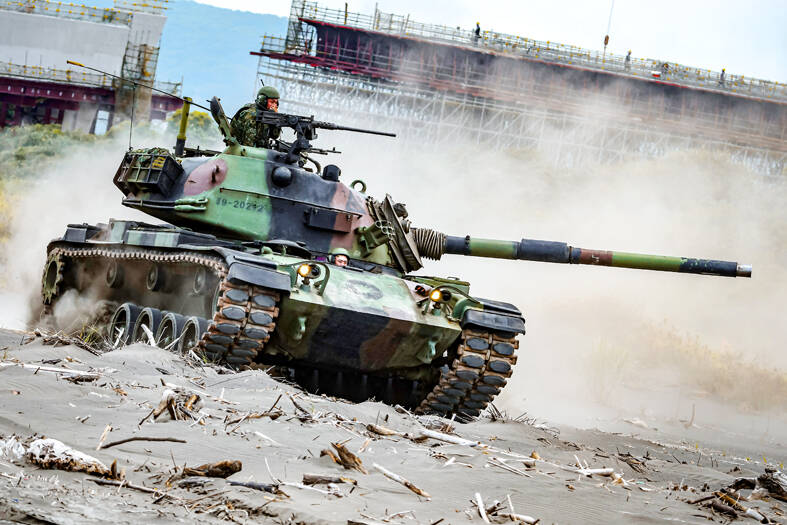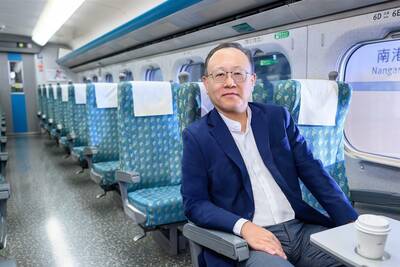The computerized war games of this year’s Han Kuang military exercises began yesterday and are to include lessons learned from the Russian invasion of Ukraine and the Israel-Hamas conflict, the Ministry of National Defense said.
Special emphasis would also be given to scenarios such as “gray zone” activities and a surprise attack on Taiwan by Chinese forces operating under the false pretense of a drill, the ministry said.
The around-the-clock tabletop exercises span eight days and seven nights, concluding on Friday next week, the ministry said.

Photo: Liu Yu-chieh, Taipei Times
Live-fire Han Kuang drills are to be held from July 22 to 26 and would also incorporate lessons learned from the Russia-Ukraine and Israel-Hamas conflicts, it said.
Overall, the 40th edition of the Han Kuang military exercises is focused on countering cognitive warfare and mobilizing reserve forces to conduct asymmetrical warfare against the enemy, it said.
Other key priorities are to test the military’s ability to transition between peacetime and war; joint interdiction operations and anti-blockade capabilities; overall air defense capabilities; and operations under a decentralized command structure, the ministry said.
The drills would test the military’s ability to act in compliance with the rules of engagement and international law, it added.

The inspection equipment and data transmission system for new robotic dogs that Taipei is planning to use for sidewalk patrols were developed by a Taiwanese company, the city’s New Construction Office said today, dismissing concerns that the China-made robots could pose a security risk. The city is bringing in smart robotic dogs to help with sidewalk inspections, Taipei Deputy Mayor Lee Ssu-chuan (李四川) said on Facebook. Equipped with a panoramic surveillance system, the robots would be able to automatically flag problems and easily navigate narrow sidewalks, making inspections faster and more accurate, Lee said. By collecting more accurate data, they would help Taipei

STATS: Taiwan’s average life expectancy of 80.77 years was lower than that of Japan, Singapore and South Korea, but higher than in China, Malaysia and Indonesia Taiwan’s average life expectancy last year increased to 80.77 years, but was still not back to its pre-COVID-19 pandemic peak of 81.32 years in 2020, the Ministry of the Interior said yesterday. The average life expectancy last year increased the 0.54 years from 2023, the ministry said in a statement. For men and women, the average life expectancy last year was 77.42 years and 84.30 years respectively, up 0.48 years and 0.56 years from the previous year. Taiwan’s average life expectancy peaked at 81.32 years in 2020, as the nation was relatively unaffected by the pandemic that year. The metric

TAKING STOCK: The USMC is rebuilding a once-abandoned airfield in Palau to support large-scale ground operations as China’s missile range grows, Naval News reported The US Marine Corps (USMC) is considering new sites for stockpiling equipment in the West Pacific to harden military supply chains and enhance mobility across the Indo-Pacific region, US-based Naval News reported on Saturday. The proposed sites in Palau — one of Taiwan’s diplomatic allies — and Australia would enable a “rapid standup of stored equipment within a year” of the program’s approval, the report said, citing documents published by the USMC last month. In Palau, the service is rebuilding a formerly abandoned World War II-era airfield and establishing ancillary structures to support large-scale ground operations “as China’s missile range and magazine

Passengers on Taiwan High Speed Rail (THSR) will be required to use headphones and make phone calls in gangways under new “quiet travel” rules starting Sept. 22. THSR Chairman Shih Che (史哲) told media that THSR will run a three-month promotional campaign to ensure widespread adoption of the new rules. Those repeatedly ignoring the guidance face the potential termination of their transport contract, which can result in them getting escorted off the train, according to THSR. Shih shared his hope to cultivate an environment conducive to rest and reading for the train’s passengers, stating that these changes aim to “promote self-discipline” among passengers